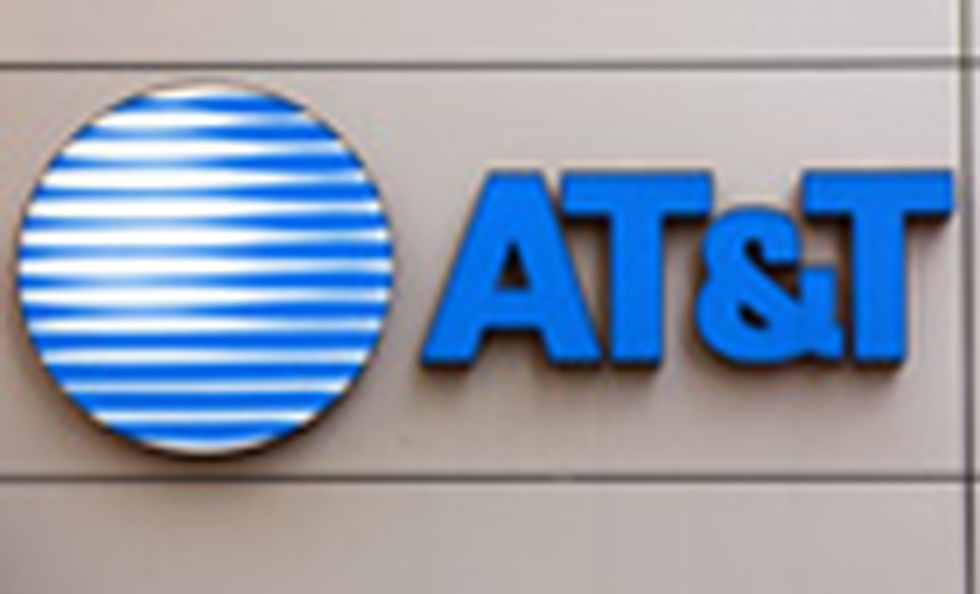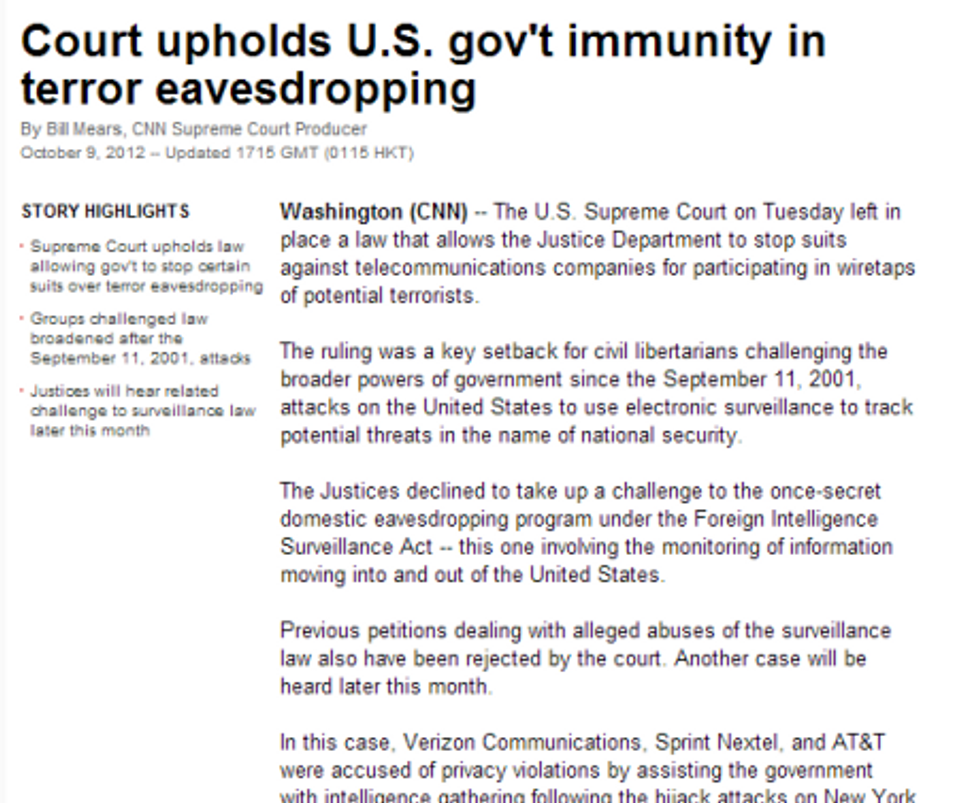So pervasive and reliable is the rule of elite immunity - even in the face of the most egregious crimes - that one finds extreme examples on a weekly basis. Six weeks ago, the Obama justice department forever precluded the possibility of criminal accountability for Bush torturers by refusing to bring charges in the only two remaining torture cases, ones involving the deaths of the detainee-victims by torture.
The Obama campaign is now running a new campaign ad against Mitt Romney that rails against a litany of Wall Street "criminals" and "gluttons of greed", but as David Dayen astutely notes, those examples were all imprisoned during the Bush era because the Obama administration has prosecuted no significant Wall Street executives for the 2008 financial collapse and thus have none of their own examples to highlight:
"So the Obama campaign could not fill a list of three Wall Street criminals that the Obama Justice Department actually sent to jail. Heck, they couldn't fill a list of one!"This is despite Eric Holder telling students at Columbia University in February of this year that his Justice Department's record of success on fighting financial fraud crimes 'has been nothing less than historic.' But not historic enough that his boss could point to, well, one Wall Street criminal behind bars as a result of DoJ's actions.
That's painfully telling. Nobody from Bank of America or Wells Fargo or Citigroup or JPMorgan Chase or Goldman Sachs or Bear Stearns or Morgan Stanley or Merrill Lynch or even Countrywide or Ameriquest was available to stand in as a 'glutton of greed' in this advertisement. Literally no major figure responsible for the financial crisis has gone to jail. So the campaign has to use two CEOs from a decade-old accounting scandal, and a garden-variety Ponzi schemer."
And now, the US supreme court just consecrated one of the most corrupt acts of the US government over the past decade: its vesting of retroactive legal immunity in the nation's telecom giants after they had been caught red-handed violating multiple US eavesdropping laws. Just as the Obama DOJ forever precluded any legal accountability for Bush-era torturers, the supreme court on Tuesday forever precluded any legal accountability for AT&T, Verizon, Sprint and other telecoms for their crucial participation in the illegal Bush NSA warrantless eavesdropping program (the Obama DOJ, needless to say, supported the position of the telecoms).
When the New York Times revealed on 16 December 2005 that the Bush administration was spying on the telephone calls and emails of American citizens without the warrants required by the criminal law, it exposed lawbreaking not only by government officials but also by the nation's largest telecoms. Multiple laws were in place at the time imposing both criminal and civil liability on telecoms for enabling government spying on the communications of their customers without warrants or other legal authority, and that is exactly what these telecoms did. One former AT&T employee, Mark Klein, publicly described how AT&T had even built a separate room with no purpose but to permit the National Security Agency unfettered access to all of its customers' communications.
What was most remarkable about those telecom laws is that - in the wake of the mid-1970s Church Committee investigation finding that the government abused its spying powers to punish and monitor dissidents - those laws were expressly written to prevent telecoms from participating in illegal government spying. They were written with the full participation of telecom lawyers to ensure that the companies' obligations were crystal clear. And most amazingly of all, the laws already contained broad immunity clauses to ensure that telecoms could never be punished for "good faith" violations, but rather only for deliberate, knowing violations of the law.
When civil liberties groups sued the telecoms on behalf of their customers whose communications had been illegally accessed by the government, federal courts began ruling against the telecoms, holding that the immunity they already had under the law would be unavailable to them, because the allegations against them amounted to knowing, deliberate violations of the law. As one federal judge put it in refusing to dismiss a lawsuit against AT&T: "AT&T cannot seriously contend that a reasonable entity in its position could have believed that the alleged domestic dragnet was legal."
But in the US, large and powerful actors must not be and are not subject to the rule of law. So telecoms hired former government officials from both parties to lobby for them and poured money into the coffers of key Democratic Senators such as Intelligence Committee Chairman Jay Rockefeller (who became the chief advocate of telecom immunity).
In 2008, the industry obtained an extraordinary act of Congress that gave them the gift of retroactive immunity from all criminal and civil liability for their participation in the illegal eavesdropping programs aimed at Americans on US soil. The immunity was enacted by an overwhelming bipartisan vote, with the support of leading Democrats including Barack Obama, who had promised - when seeking his party's nomination - to filibuster any bill that contained retroactive telecom immunity.
Immediately after this immunity was vested, groups which had been suing the telecoms and had their lawsuits terminated by the law, such as Electronic Frontier Foundation (EFF) and the ACLU, challenged the constitutionality of this immunity. They argued, among other things, that retroactive telecom immunity "violates the federal government's separation of powers as established in the Constitution" (by having Congress rather than courts resolve cases in favor of telecoms and by allowing executive branch officials full discretion as to which telecoms should be immunized), and "robs innocent telecom customers of their rights without due process of law" (by retroactively barring them from seeking justice in court for the violations of their legal rights).
Federal courts, needless to say, rejected these claims, dismissed the lawsuits against the telecoms, and upheld the validity of telecom immunity. It was these decisions that the supreme court on Tuesday refused to review, thus forever shielding lawbreaking telecoms from any legal accountability. Thus, the same tribunal that regularly consigns ordinary, powerless Americans to prison for decades for even trivial offenses yet again acts to protect the most powerful actors from any consequences for serious crimes: that is the US justice system in a nutshell.
As usual, it is not only the executive branch, Congress and courts which enable this elite immunity, but also the nation's establishment media, which obscures and distorts these issues with flagrantly misleading claims. Yesterday, for instance, CNN purported to report on the supreme court's decision, and told its readers that what "civil libertarians" were objecting to was eavesdropping on "potential terrorists" [my emphasis]:
"The U.S. Supreme Court on Tuesday left in place a law that allows the Justice Department to stop suits against telecommunications companies for participating in wiretaps of potential terrorists.
"The ruling was a key setback for civil libertarians challenging the broader powers of government since the September 11, 2001, attacks on the United States to use electronic surveillance to track potential threats in the name of national security. . . .
"In this case, Verizon Communications, Sprint Nextel, and AT&T were accused of privacy violations by assisting the government with intelligence gathering following the hijack attacks on New York and Washington."
This is all patently misleading. Nobody has ever objected to eavesdropping on "potential terrorists"; nobody objects to the "use [of] electronic surveillance to track potential threats in the name of national security"; and certainly nobody claims there are "privacy violations" from eavesdropping on terrorists.
The issue is and always has been illegality, not eavesdropping. The objection is not to government eavesdropping itself, but to government eavesdropping in violation of the law, by spying without the court warrants required by that law, a law that made it a felony - punishable by up to five years in prison and a $10,000 fine for each offense - to eavesdrop on Americans without first obtaining permission from a court. Moreover, the problem is not that government spying took place against "potential terrorists" but that the communications of all Americans were swept up.
George Bush tried to distort objections to his illegal eavesdropping program into objections to "eavesdropping on the terrorists", and here we have CNN in its headline and lede perpetuating that same claim. The CNN article does eventually note that "the law had previously required the government to justify a national security interest before any phone calls and emails originating in another country could be monitored", that "a federal judge had to sign any search warrant" and that "Bush secretly suspended that requirement following the attacks" (Bush did not "secretly suspend that requirement but rather "secretly broke the law": presidents do not have the power to "suspend laws": that's called "breaking the law").
Despite those caveats, the CNN headline and the lede of the article give the clear impression that the objections are to eavesdropping on terrorists, something no sane or rational person could oppose:
So congratulations are once again in order for AT&T, Verizon, Sprint and the other national telecom giants. In a country that imprisons more of its ordinary citizens than any other on the planet by far, and that imposes more unforgiving punishments than any other western nation, our most powerful corporate actors once again find total impunity even for the most serious of lawbreaking.
Skepticism of US journalists
Relating to all of this, I had what I considered to be a quite revealing Twitter exchange this morning with the New York Times' Matthew Rosenberg, who covers Afghanistan for that paper. Rosenberg intervened in a discussion of US drones in Pakistan by vehemently denouncing the Pakistani government for "outright, unabashed lies", and then arguing: "it's problematic to base analysis off statements from [a government] that repeatedly misleads in public."
When I asked him whether he would apply those same notes of skepticism to the US government, he repeatedly refused to answer, both in response to my question and those from others. He just kept insisting that the issue was irrelevant. But how could it possibly be that Pakistan's propensity to lie is relevant to the drone debate, but the US government's propensity to do so is irrelevant? That's particularly striking given the clear documentation that top US government officials have lied about US drones. I have posted all the relevant Twitter comments here.
Apparently, like so many US journalists, Rosenberg is quite willing and eager to publicly denounce foreign government leaders as liars and to insist that their statements on drones must be taken with great skepticism, but - as an American reporter working for a US newspaper writing about US policy - he refuses to say the same about his own government (he did eventually say that all government claims should be treated with skepticism). Rosenberg has actually done some good journalism, but that double standard perfectly captures the role many establishment journalism plays in the US.



